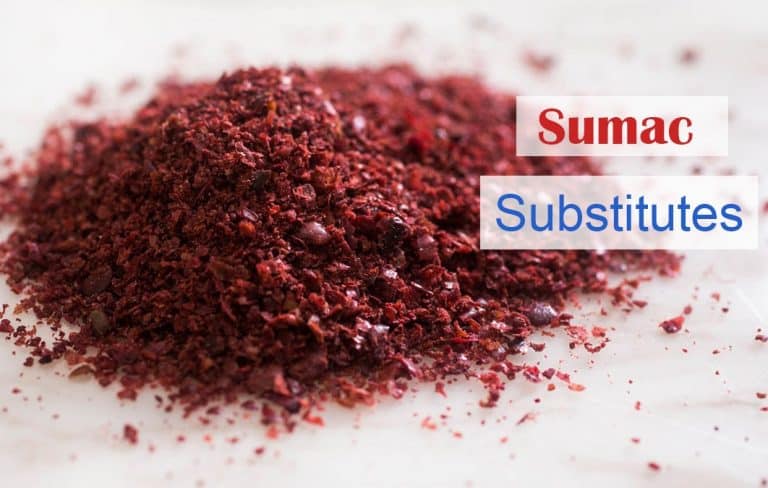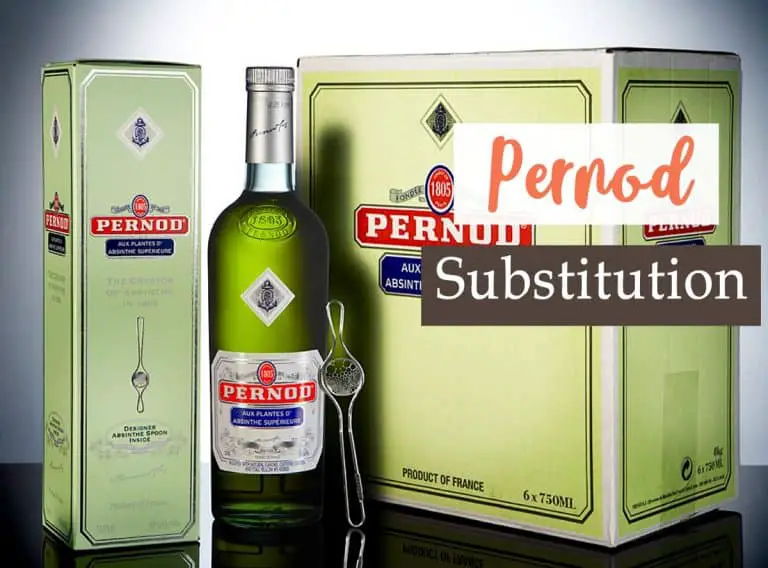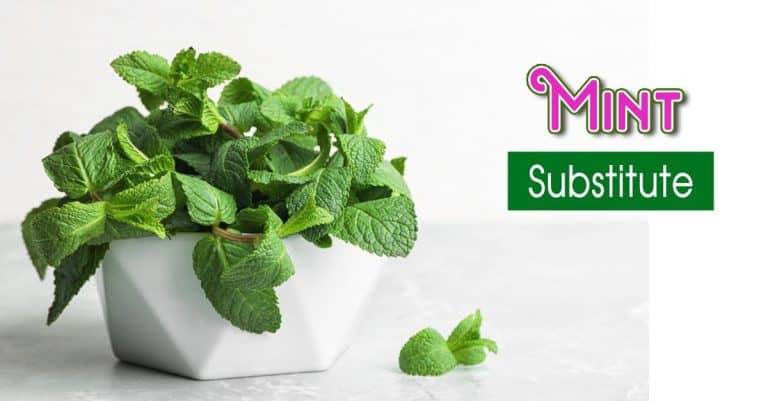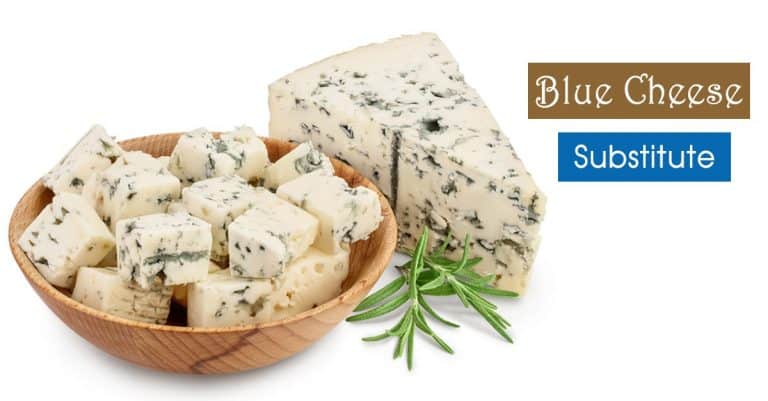
For a long time, Cognac has been a staple to enrich the flavor of savory and sweet recipes. Chances are, you can’t always have Cognac available in the kitchen. That’s when a Cognac alternative, either alcoholic or non-alcoholic, comes in handy.
This article will show you 10 ideas to substitute for Cognac in cooking when you’re in a rush.
Top 10 Substitute Options For Cognac In Cooking
Alcoholic Substitutes
1. Brandy
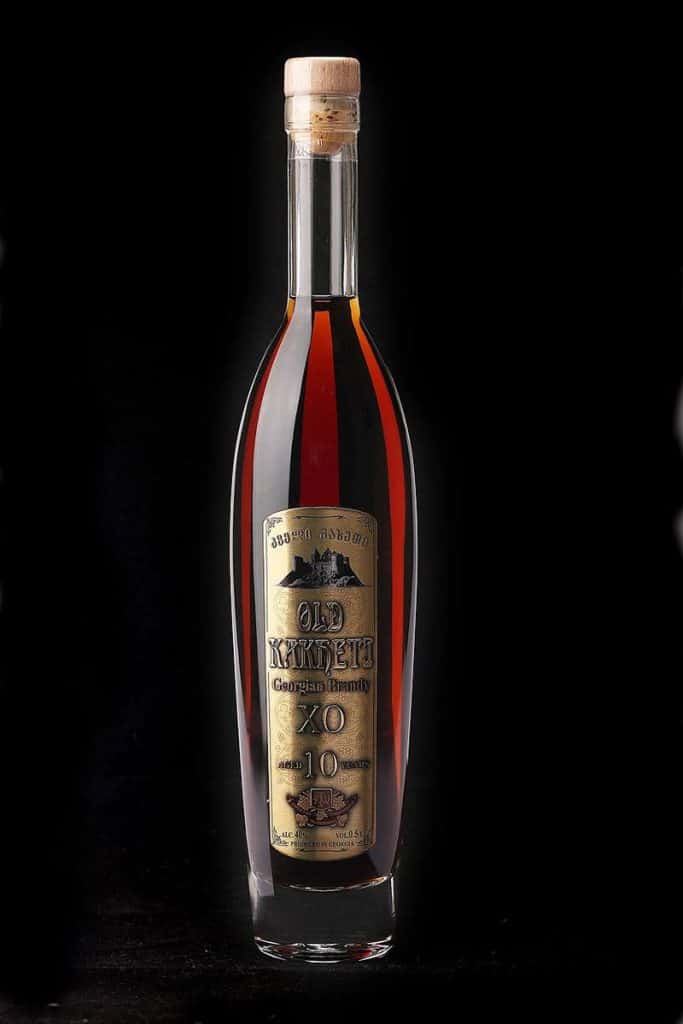
As you may know, Cognac is a variation of Brandy, so any kind of this snifter makes a suitable substitute for Cognac. Despite originating from France, nowadays, Brandy can be produced anywhere by fermenting and distilling fruit juice.
Among them, Brandy, made from white grape juice, shines as an excellent Cognac substitute for its similar ingredient. Brandy also delivers a fruity and bittersweet flavor. In fact, not many can notice the difference between white grape Brandy and Cognac but some gourmets with well-trained palates.
So, for home cooking, switching from Cognac to Brandy is nearly unnoticeable. You can use Brandy instead of Cognac in almost all recipes from sweet to savory like cocktails, desserts, sauces, salads, white and red meat.
We love the Brandy mushroom sauce – an excellent topping for steak, spaghetti, and chicken breasts. You can easily grab the ingredients in any store: Brandy, mushrooms, mint leaves, green onions, and heavy cream.
With 35 – 60% of alcohol content, Brandy does its best in tenderizing and moisturizing the meat. The fruity and spicy liquor paired with the earth, sweet taste, and an umami undertone of mushroom brings out a creamy and flavorful combination to please any fussy eater.
The good thing is, this sauce is a one-for-all recipe. If you are allergic or can’t find mushrooms, any mushroom substitutes can be the answer to your dreams.
Aside from using Brandy as a flavor booster, it’s advisable to enjoy it as an after-dinner snifter. A shot of Brandy contains about 90 mg of vitamin C – an antioxidant that can improve your immune system.
Also, you can put an end to some respiratory issues like sore throat and coughing with a sip of Brandy, thanks to its anti-inflammatory and bacteria-fighting properties.
2. Armagnac
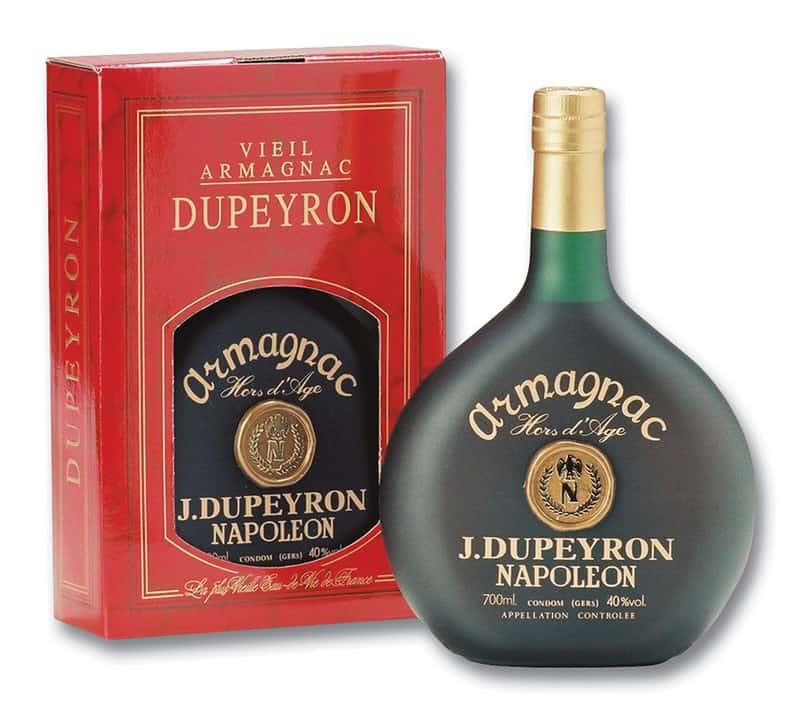
Armagnac is another liquor under the Brandy family, originating from the southwest regions of France with over 7 centuries of history. Like Cognac, Armagnac was made from grapes but only through a single distillation.
Thanks to its same ingredient, you can replace Cognac with Armagnac in a pinch. You will anticipate a well-rounded and full-bodied taste, glorified with a pronounced spice and fruitiness. But Armagnac is a little drier and more robust in taste.
For its strong profile, you can only substitute Armagnac for Cognac in culinary preparation, such as making marinade and gravy, spicing up a sauce, or enhancing the flavor of pastries. Remember to add about 10 ml less of Armagnac (compared to Cognac) not to overpower the dish.
Anyone who knows Armagnac has heard about the Prunes in Armagnac recipe at least once. The caramel sweetness of prunes makes a perfect background for the spice of Armagnac to shine. You can serve this delicious dish with ice cream to put a beautiful ending to any meal.
Armagnac can lower the blood sugar level up to 24 hours, reducing the risk of diabetes by about 30% if you consume it 3 or 4 times weekly. Resveratrol in Armagnac also aids in removing free radicals and fights off cancer cells, especially for pancreatic cancer.
3. Sherry

Another liquor from white grape juice on this list is Sherry, coming from Spain and having left its mark for over 3,000 years. This fortified liquor ends with approximately 20% of alcohol content.
Sherry also offers a rich and complex flavor profile from soil to glass, similar to Cognac. It leads you from a sweet and fruity primary taste and finishes with a hint of spice lingering in every single taste bud. You can use Sherry when making sauces for vegetables, meat, and some glazings for desserts.
The recommended Sherry – Cognac ratio to reach the same strength for cocktails is 2:1. For cooking, a 1:1 proportion is enough, especially when making sauces. If you prefer richer sauces, you can get more well-aged Sherry to satisfy your palate.
Like Brandy, Sherry and mushroom is a match made in heaven, complementing each other naturally. But what we want to introduce you to now is the Sherry-braised short ribs. The meaty flavor of ribs is perfectly delivered in a well-tenderized texture that can even fall apart in your mouth.
This type of liquor is low-calorie, only 58 kcal in 50 ml. The best thing is that this liquor increases the production of HDL – good cholesterol, supporting to carry potentially harmful cholesterol back to your liver and away from the arteries.
4. Scotch Whiskey
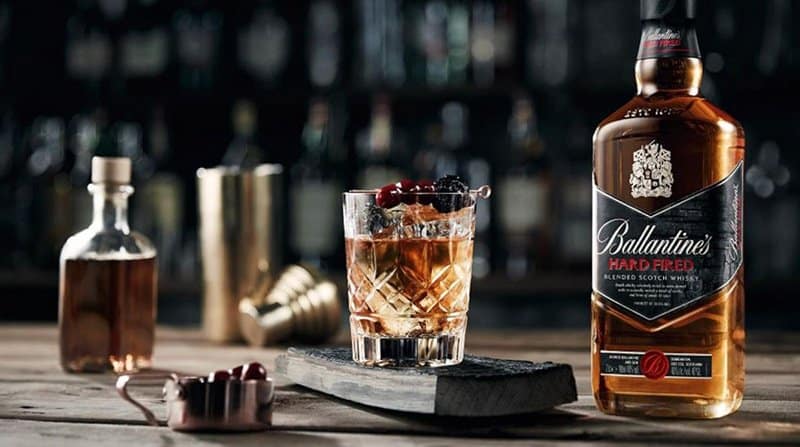
The story of Scotch Whiskey started in the 15th century, but it’s not until the 18th century did it gain a reputation thanks to commercial production. This Whiskey was distilled from rye and wheat with the same alcohol content as Cognac – 40%.
Scotch Whiskey is not a crowd-pleaser because it comes with a rich, smoky, spicy, and nutty flavor with a trace of sweetness. So, you don’t want to replace Cognac with this liquor in cocktails.
Don’t get it wrong. This strong flavor blossoms in many popular dishes. As a rule of thumb, light Scotch Whiskey pairs well with spicy and seafood meals. Meanwhile, strong Whiskey is the secret to protein-rich meals. Brie or Cheddar cheese also welcomes the spice of Whiskey.
If you are still stuck in the culinary ocean to find a dinner recipe, why not give the Honey chipotle barbecue chicken a try? BBQ chicken itself is already tasty, but adding the flavors of honey and Whiskey gives this savory dish a sweet and spicy kick that catches your palate at the end.
Scotch Whiskey is fat-free and has very little sodium. Not to mention, the simple sugar in this beverage can be quickly processed. These features are ideal for promoting weight loss.
Also, if you feel anxious or stressed, a shot of whisky can take off the edge. Alcohol is an effective depressant to the nerves, but remember never to abuse it.
5. French Wine (Red/White)
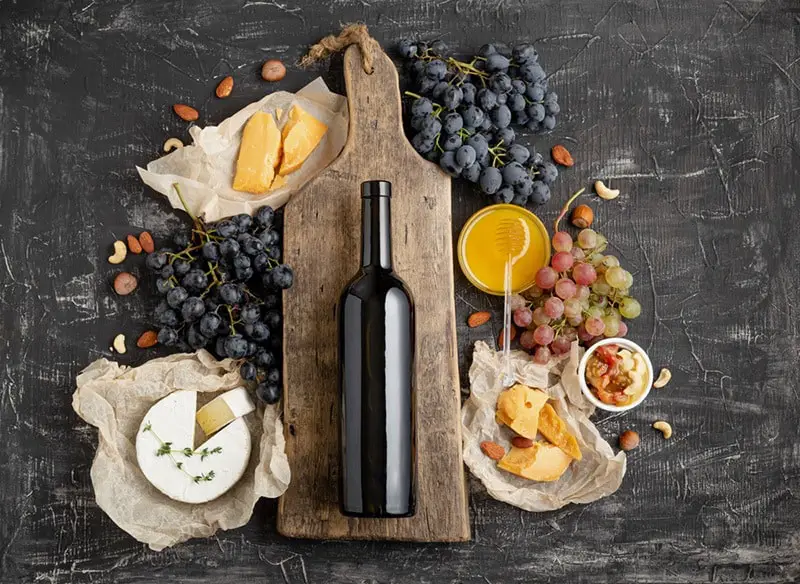
Another substitute for Cognac in cooking is French wine, including white and red variants. You will be surprised to know the prolonged history of this wine. It was first introduced in France in the 5th century under the rule of the Roman Empire.
White wine is our preferred option as white grape juice is its main ingredient, ensuring similar sweetness and fruitiness with Cognac. You put white wine in many gravies and sauces for pasta, French onion soup, mashed potatoes, veggies, beef broth, and chicken broth recipes.
If you happen to have just red wine on hand, it’s also a decent replacement for Cognac. Though the red version falls on the bitter side, you can still experience a fruity flavor with a sweet undertone, especially the acidic signature.
Red wine is a good companion in a red meat dish with herbs, softening the meat and enriching its flavor. Interestingly enough, chefs usually utilize red wine to neutralize the dish if they marinate the meat with too much garlic.
Don’t think that French wine only appears in savory recipes. Let us drive you to an aesthetic world with the Red wine truffles with dried cherries dish. This dessert not only delights your palate with a perfect balance of sourness and sweetness but also serves you an eye feast.
Many studies have proved a positive connection between moderate French wine intake and a healthy heart. The recommended daily consumption is two glasses for males and one glass for females.
Plus, polyphenols found in grapes and wine can support the gut microbiota for better gut health.
6. Bourbon
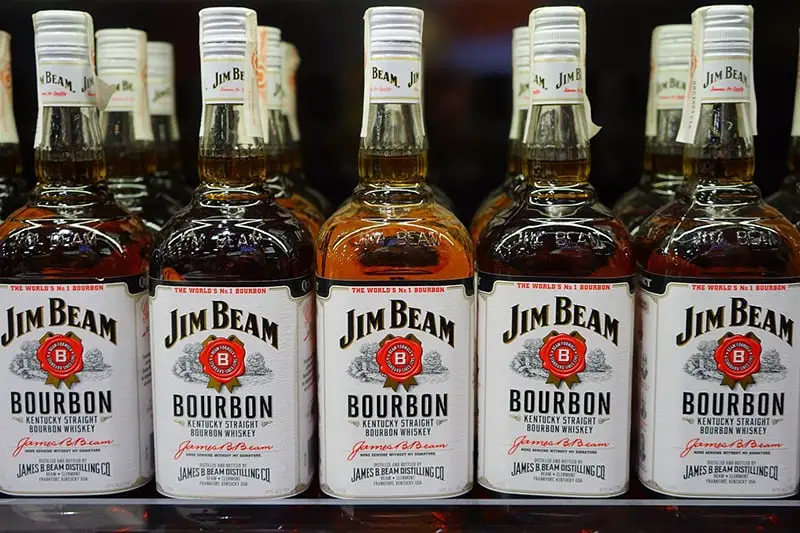
Bourbon Whiskey is native to America, despite being named after the Bourbon dynasty in France. A liquor is called Bourbon only when there is no other flavor except corn (at least 51%), rye or wheat, malt, and water, with about 40% – 80% of alcohol content.
Due to the different ingredients, you can’t expect a Cognac-like flavor from Bourbon. But, the aroma and visual effects it brings can live up to Cognac. That’s why we put it on our list.
You’ll feel a strongly sweet note of caramel, vanilla, and oak. This taste will come in handy in savory sauce recipes, calling for Cognac. It also makes an excellent glaze for chicken, meat, and fish. Remember the ratio 1:1 for better substitution and add some fruit juice for a fresh hint.
Too much protein? It’s time to treat yourself to a veggie dish. Don’t miss the Corn and cauliflower sautéed in Bourbon butter for the world. This fiber dish is not bland at all but full of flavor, from sweet to nutty and buttery, plus the fresh aroma that you’ll never forget.
Bourbon is packed with an abundant amount of ellagic acid – an antioxidant that can reduce the likelihood of certain carcinogen formations. This Whiskey is also heart-friendly alcohol, preventing cholesterol from building up in the arteries.
7. Calvados
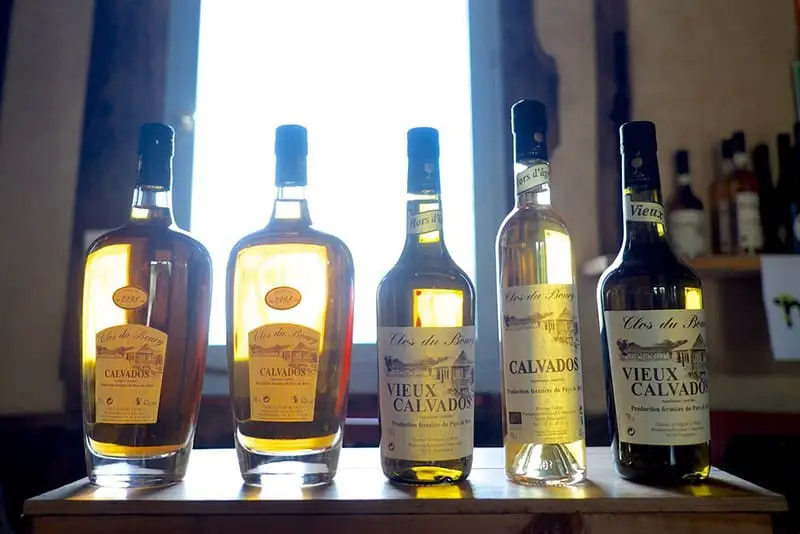
Calvados is also a type of Brandy from Normandy, France, but we place it below the fold for a reason. Its main ingredient is apple or pear, with little link to the Cognac taste.
You can expect a well-balanced combination of acidity and sweetness with a natural reminiscence of apple or pear. So, the point here is that its fruity taste can somewhat replace Cognac in a pinch.
Calvados work fine in desserts like apple tart, pancake, and some savory dishes of chicken or meat with an additional umami note.
You can replace one Cognac for one Calvados in cooking, but be careful when making cocktails. 20 ml of Calvados is equivalent to 30 ml of Cognac for its distinctive apple trace.
The Pork with Calvados sauce is a classic and easy recipe you can try for a quick meal. Within only 30 minutes, you will have tender and flavorful meat flooded in a smooth and aromatic sauce.
We all know that an apple a day keeps the doctor away. Apple is the basis of Calvados, boasting a lot of minerals (iron, potassium), amino acids (tannin, pectin), and vitamins (B6, B1, B12, C).
Tannin prevents atherosclerosis, strengthens blood vessels, and enhances metabolism. The presence of phenolic compounds in Calvados also removes free radicals from your body, thereby lowering the risk of cancer.
8. Rum
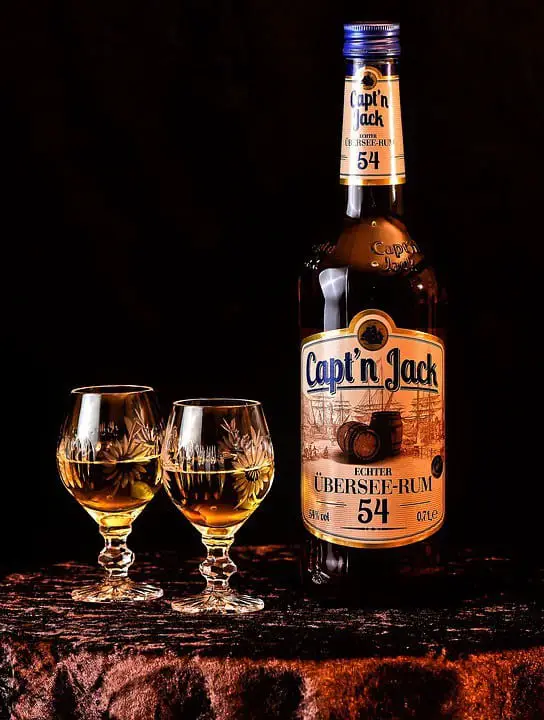
Rum comes from the West Indies and has been recognized since the 1650s. The basis of Rum is sugarcane juice or molasses being fermented then distilled.
From its ingredients, you can guess that sweetness is the primary tone of Rum, along with a grassy taste. You can utilize Rum in desserts, stewed dishes of beef, pork, or in seafood and poultry recipes.
Due to its strong sweetness, you should add about 15 ml of fruit juice when making cocktails with Rum. In most sweet and savory dishes, 1:1 proportion is fine. But if you feel it overpowering, adding some apple juice can help.
Have you ever thought of spicing up a snack like date balls? It’s time to give it a go. A touch of sweet alcohol from Rum is sure to make a flavor twist.
One or two tablespoons of Rum a day can treat the common cold and relieve the sore throat, thanks to its antibacterial properties. Also, consuming Rum increases bone minerals, preventing muscle pain and alleviating arthritis.
Non-Alcoholic Substitutes
1. Fruit Juice

Fruit juice is the savior for those who are allergic or want to say no to alcohol, and it’s also the most easily available on our list. But remember that using fruit juice is a risky substitution, lacking fermentation to complete the desired flavor.
Anyway, the presence of fruit juice in the recipes can fill in the fruity blank of Cognac. You can choose juice from peaches, apples, pears, apricots, pineapples, or cranberries to deliver a fresh and fruity kick without too much sweetness.
Other citrus fruits, such as orange juice or orange extract, lime juice, and lemon juice, also work well, offering a decent outcome of recipes.
Fruit juice can go well in sweet and savory recipes. But when making sauce, it’s better to dilute it with some water to lower the sweetness.
Compared to liquor, fruit juice stands out in the freshness and health benefits. Fruits are a significant source of fiber, essential minerals, and vitamins.
2. Brandy Extract
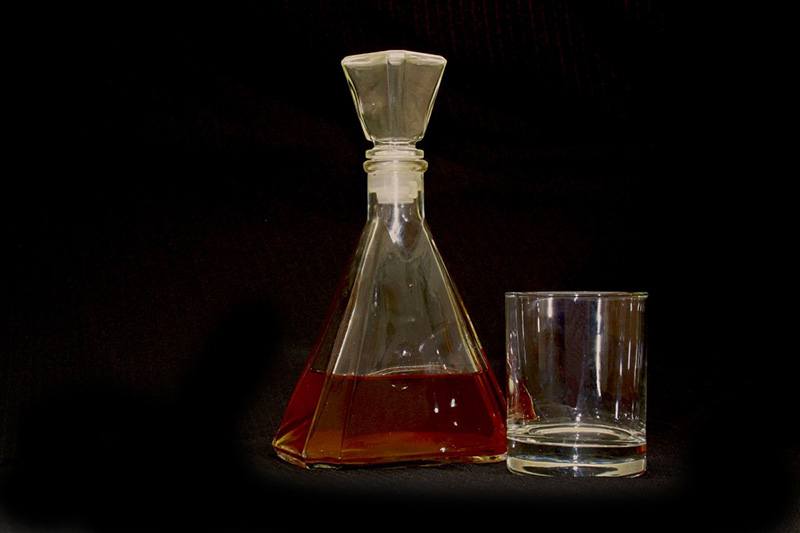
Don’t let the name fool you. Brandy extract is 100% alcohol-free yet offers the same flavor as Brandy. So it is the best non-alcoholic substitute for Cognac in cooking.
You can use Brandy extract in desserts, mocktails, and other baked dishes. What’s more, Brand extract can pop up in brown gravies for red meat recipes.
It’s recommended to substitute Brandy extract for Cognac with a 1:1 ratio. But you will need some more when baking to balance the flavor.
If you can’t find any Brandy extract, non-alcoholic vanilla extract, rum extract, or almond extract can also do the trick.
Frequently Asked Questions
1. What Is The Best Substitute For Cognac In Different Recipes?
Having so many alternatives that you don’t know when to use what for the best? Worry not. We’ll show you detailed suggestions on what Cognac substitutes will be ideal in which recipes.
| Recipes | Substitutes |
| Desserts | Sherry, Brandy, Calvados |
| Cocktails | Brandy, Rum, Calvados |
| Poultry | Brandy, Sherry, Calvados, Rum |
| Beef / Steak | Brandy, Sherry, Rum, Calvados |
| Seafood | Scotch Whiskey, White/Red wine, Rum |
| Onion soup | Brandy, Sherry |
| Gravy | Armagnac, Brandy, White/Red wine |
| Salads | Sherry, Brandy, fruit juice, Brandy extract |
| Cheese-based recipes | Scotch Whiskey |
| Non-alcoholic recipes | Fruit juice, Brandy extract |
2. What Are Cognac Origin and Its Health Perks?
Cognac origin was traced back to the 17th century, named after its hometown in France. It was double-distilled from white grape juice after fermenting for about three weeks.
Cognac becomes smoother, more refined, and more complex as it ages, though people hardly keep it in casks over 40 or 50 years. The final product comes with 40% of alcohol content, revealing a spicy, bittersweet taste and a touch of citrus lingering in the nose.
Drinking Cognac may link to many health benefits. Its richness of antioxidants helps prevent the risk of heart disease, blood clots, vision loss, type 2 diabetes, gallstone, and cancer.
But, “it’s not good to have too much of anything,” said the famous author Andrew Clements. It’ll do more harm than good if men consume more than two drinks and women consume more than one drink a day.
Conclusion
We’ve walked you through 10 candidates for the best substitute for Cognac in cooking, including alcohol and alcohol-free alternatives. We hope you find this article helpful in your cooking journey.
Honestly, there is no perfect substitute for all, but you’re almost there if you know what to use in different recipes. Don’t hesitate to try and experiment, based on our recommendations or your preference.
Related Posts:
- Pernod Substitution: 9 Worth-Noting Alternatives For Your Recipes
- 8 Best Almond Extract Substitutes For Your Recipes
- Best Substitute For Orange Marmalade To Upgrade Your Menu

